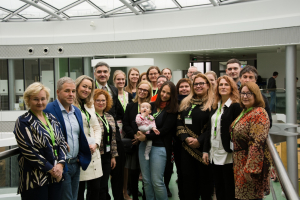Let’s sort out the disease that steals our memory
The International Clinical Research Center (ICRC) in Brno is part of the new ADDIT-CE project, focused on the early diagnosis of Alzheimer’s disease (AD). AD affects millions of people worldwide every year and significantly affects the quality of life of both the patients themselves and their loved ones. It also represents a societal burden associated with the reduced employment of the sick, the costs of their treatment and related social services. Although we cannot yet cure AD, early diagnosis can slow down the progression of the disease. The ADDIT-CE project is funded by the Excellence Hubs programme, which supports the collaboration of all key partners driving innovation in AD diagnostics. Leading research teams from Brno and Bratislava thus have the opportunity to establish links with representatives of industry and with decision-making bodies of the state administration responsible for setting effective policies to combat dementia. The expected output is not only the cultivation of ecosystems for the early detection of AD, but also the effective use of new technologies in practice.
 Photo: The initial meeting of the ADDIT-CE project managers (author: CEITEC)
Photo: The initial meeting of the ADDIT-CE project managers (author: CEITEC)
As part of the ADDIT-CE project, researchers from the Central European Institute of Technology of Masaryk University (CEITEC MU), Masaryk University, ICRC and the Biomedical Center and Institute of Neuroimmunology of the Slovak Academy of Sciences collaborate with private biotechnology companies, specifically BioVendor, Multiplex DX and Geneton. Patients and their loved ones will be represented by organizations such as the Slovak Alzheimer Society, the Czech Alzheimer Society, the Memory Center and the Czech Brain Aging Study. The regional government will be involved through the Ministry of Health of the Slovak Republic and the South Moravian Innovation Center. The project coordinator is Jozef Hrizt from CEITEC MU.
The ICRC is part of most of the project packages that deal with the search for early biomarkers of the disease, i.e. measurable values indicating the presence of the given disease or the assumption of its occurrence. As stated by MUDr. Kateřina Sheardová, Ph.D. from the ICRC Dementia research team: “We will examine these new biomarkers in the sera and cerebrospinal fluid of people at risk of developing Alzheimer’s disease who are participants in our Czech Brain Aging Study. We will compare them with the neuropsychological and magnetic resonance data that we monitor as part of our program.”
The Czech Brain Aging Study (CBAs) is a national longitudinal study, carried out at the ICRC and FN Motol, which investigates early functional, metabolic, structural and genetic biomarkers of AD and other dementias in the blood, cerebrospinal fluid and magnetic resonance imaging of patients, on a long-term basis. We thus have at our disposal a unique database mapping changes in the structure and metabolism of the brain over time in healthy individuals, in patients with mild cognitive impairment and in dementia.
“We will also investigate the protective effect of lifestyle by analyzing the data we are currently collecting as part of the study on positive psychology and spiritual well-being. We can then put the subsequent findings into practice in the form of recommendations on how to influence lifestyle as part of prevention,” adds Sheardová.
Together with the Slovak MEMORY Center, we are also preparing an intervention study for patients with a higher risk of AN. As part of the study, we will offer physical activity, sleep control and yoga techniques that positively affect mental health.
The initial meeting of the project managers took place on January 25, 2023 in the premises of CEITEC MU in Brno. Details of the meeting and more information about the ADDIT-CE project can be found in the CEITEC press release.

Disclaimer: Funded by the European Union. Views and opinions expressed are however those of the author(s) only and do not necessarily reflect those of the European Union or European Research Executive Agency. Neither the European Union nor the granting authority can be held responsible for them.

